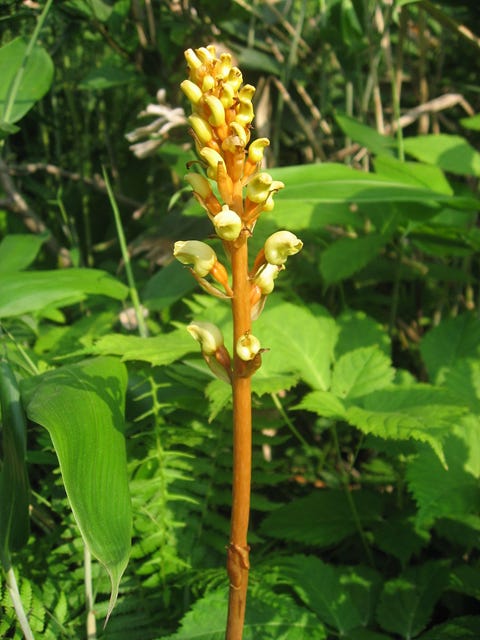For this post, I’m continuing with last week’s brain/neurology theme by sharing something I did for chemistry class last semester (yeah, never got around to taking chem in undergrad). I had to pick a molecule found in Chinese herbal medicine and write about it. I picked gastrodin, the active ingredient in Tian Ma, the rhizome of the Gastrodia orchid. I’ll spare you my crude chemical structure diagrams and just get round to the summary I put together to present to the class.
Tian Ma 天麻
Pharmaceutical Name: Rhizoma Gastrodiae
Category: Extinguish Wind, Stop Tremors
Properties: Sweet, Neutral
Channels Entered: Liver
Actions: Extinguishes Wind, calms the Liver, stops spasms and tremors, subdues Rising Liver Yang, alleviates pain, disperses Wind-Damp Bi
(Bensky et al., 2004)
Botanical Information (Liu et al., 2018)
Gastrodia elata Blume
Genus: Gastrodia
Family: Orchidaceae
The gastrodia plant contains no chlorophyll. Instead, it lives off of the honey fungus (Armillaria mellea) for carbon and nutrients. The honey fungus is itself a parasitic organism, feeding off of infected trees, which makes the gastrodia a parasite of a parasite, so to speak. It spends its entire life cycle underground except for its flowering stage. It grows anywhere from 30–150 cm tall. The rhizome (medicinal part) is about 10 cm long, and 3–4.5 cm diameter.
Gastrodia is native to eastern Asia: China, Korea, Japan, and India. It is most at home in humid mountainous areas at an altitude of 400–3,200 meters above sea level. It is harvested during the winter (called Dong Ma, considered the best quality) and spring (Chun Ma, of lesser quality). The wild plant now endangered in China, cultivation is the main commercial source.
Herb Lore
Ancient names included Chi Jian (Red Arrow) and Gui Dou You (Ghost Post Governor*):
From Shen Nong Ben Cao Jing (Divine Famer’s Materia Medica):
“Chi Jian is acrid and warm. It mainly kills demonic and spiritual matters, gu toxins, and malign qi. Protracted taking may boost the qi and [physical] force, help yin to grow, make one fat and strong and the body light, and lengthen life. Its other name is Li Mu (Parting Mother). Yet another name is Gui Du You (Ghost Post Governor). It grows in rivers and valleys.”
(Yang, 1997)
*The Post Governor in ancient China was kind of like a sheriff, and Tian Ma is kind of like a Post Governor that tracks down ghosts.
Gastrodin
The chief bioactive constituent of Tian Ma is a phenolic glucoside called gastrodin. Isolated gastrodin is available as an over-the-counter drug in China. It may be extracted from the rhizome or (more commonly, nowadays) by chemical synthesis. Gastrodin makes up only 0.41% of the dried herb; extraction methods can be expensive, wasteful and toxic. (Liu et al., 2018)
Review of Research (Liu et al., 2018)
· Epilepsy: Gastrodin can inhibit enzymes that degrade Gamma-aminobutyric acid (GABA), a major inhibitory neurotransmitter in the brain; also decreases glutamate, an important excitatory neurotransmitter; also found to inhibit MAPK as well as TNF-α and IL-1β to decrease brain inflammation.
· Alzheimer’s disease: Gastrodin can reduce levels of Amyloid Beta (Aβ) peptide, which is a major constituent of senile plaques.
· Parkinson’s disease: Gastrodin has a protective effect on dopaminergic neurons as well as inhibiting TNF-α and IL-1β.
· Anxiety: Lowers IL-6 and IL-1β in the hippocampus.
· Depression: regulates monoaminergic neurotransmitter systems by decreasing metabolism of serotonin (5-HT) and dopamine.
· Vascular dementia: Gastrodin can improve learning/memory ability by upregulating the brain’s cholinergic system function.
More Research
· Hypertension: Gastrodin can reduce levels of angiotensin II, aldosterone, and angiotensin type 1 receptors to lower blood pressure. It can antagonize catecholamine transmitters and calcium channels to promote vasodilation. (Qian et al., 2020)
· Migraine: Study using Tian Ma (Rhizoma Gastrodiae) and Chuan Xiong (Radix Ligustici Chuanxiong) together found enhanced serotonin and decreased glutamate expression, with reduction in permeability of the blood brain barrier. (Wang et al., 2015)
References
Bensky, D., Clavey, S., Stöger, E., & Gamble, A. (2004). Chinese herbal medicine: Materia medica (3rd ed.). Eastland Press.
Liu, Y., Gao, J., Peng, M., Meng, H., Ma, H., Cai, P., Xu, Y., Zhao, Q., & Si, G. (2018). A review on central nervous system effects of gastrodin. Frontiers in Pharmacology, 9(24). doi: 10.3389/fphar.2018.00024
Qian, L., Yan, S., Li, Y., Wu, L., Zheng, Y., Wang, Y., & Fang, Z. (2020). The effects of gastrodin injection on hypertension: A systematic review and meta-analysis. Medicine, 99(27), e20936. https://doi.org/10.1097/MD.0000000000020936
Wang, Q., Shen, L., Ma, S., Chen, M., Lin, X., Hong, Y., Liang, S., & Feng, Y. (2015). Effects of Ligusticum chuanxiong and Gastrodia elata on blood-brain barrier permeability inmigraine rats. Die Pharmazie, 70(6), 421–426.
Yang, S.-Z. (1997). The divine farmer’s materia medica: A translation of the Shen Nong ben cao jing. Blue Poppy Press.
Note: this newsletter is for information purposes only and is not intended as medical advice. Please seek the opinion of a health care professional for any specific medical issues you may have.



